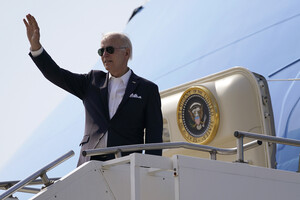The visit of the US leader was not as successful as he would have liked.

US President Joe Biden at the summit Gulf and Arab leaders said the United States would remain an active partner in the Middle East, but he failed to secure a commitment to a regional security axis that would include Israel, as well as an immediate increase in oil production. Reuters.
“The United States is invested in building a positive future for the region in partnership with all of you — and the United States is not going anywhere,” he said, according to a transcript of the speech.
Biden, who began his first Middle East trip to Israel, presented his vision and strategy for America's involvement in the Middle East at the Arab summit in Jeddah. However, the summit communique was vague, and Saudi Arabia, Washington's most important Arab ally, poured cold water on US hopes that the summit could help lay the groundwork for a regional security alliance, including Israel, to counter Iranian threats.
“We think there's a lot of value in including as many capabilities as possible in that region, and certainly Israel has a significant air and missile defense capability because they need it. But we are conducting these negotiations on a bilateral basis with these countries,” said a senior administration official.
The plan to connect air defense systems may not be easy for Arab states that do not have ties to Israel and do not want to be part of a perceived alliance against Iran that has a powerful regional network of partners including Iraq, Lebanon and Yemen.
Saudi Foreign Minister Prince Faisal bin Farhan Al Saud said he was not aware of any discussions regarding a Gulf defense alliance with Israel, and that the kingdom was not involved in such talks.
He told reporters after the US-Arab summit, that Riyadh's decision to open its airspace to all air carriers has nothing to do with the establishment of diplomatic relations with Israel and is not a precursor to further steps.
Biden focused on the summit with the six Gulf states and Egypt, Jordan and Iraq, downplaying the meeting with the crown prince of Saudi Arabia, also known as MbS, who has drawn criticism in the United States for human rights concerns.
Biden previously said he would make the regional power of Saudi Arabia an “outcast” on the world stage over the 2018 killing of journalist Jamal Khashoggi by Saudi agents, but ultimately decided that US interests demanded a realignment, not a break, in relations with the world's top oil exporter.< /p>
«The president raised the issue… And the crown prince repliedthat it was a painful episode for Saudi Arabia and that it was a terrible mistake,” said Saudi Arabia's Minister of State for Foreign Affairs, Adel al-Jubeir.
< p>Jubeir, speaking to Reuters on Friday, said MbS was proving that trying to impose values on other countries by force can backfire.
“It didn't work when the US tried to impose values on Afghanistan and Iraq. In fact, it backfired,” Jubeir quoted Crown Prince Biden as saying. “Countries have different values, and these values must be respected!”
At the same time, Biden needs the help of the OPEC giant Saudi Arabia during the period of high oil prices and other problems that arose after the Russian attack on Ukraine. Washington also wants to curb Iran's influence in the region and China's global influence.
Biden arrived in Saudi Arabia hoping to secure an oil production deal to help lower gasoline prices, which have pushed U.S. inflation above a 40-year high and threatened his ratings.
“He leaves the region empty-handed, but hopes that the OPEC+ group, which includes Saudi Arabia, Russia and other producers, will increase production at the meeting on August 3″, – the publication notes.
The countries of the Persian Gulf, which refused to side with the West against Russia on Ukraine, are seeking specific commitments from the United States regarding strategic ties that have been strained by the perceived withdrawal of the United States from the region. and their exclusion from indirect U.S.-Iranian talks to renew the 2015 nuclear pact, which they see as flawed because they do not address concerns about Iran's missile program and behavior.
In turn, Israel encouraged Biden's trip to Saudi Arabia, hoping it would lead to warmer relations between him and Riyadh as part of a broader Arab rapprochement.




